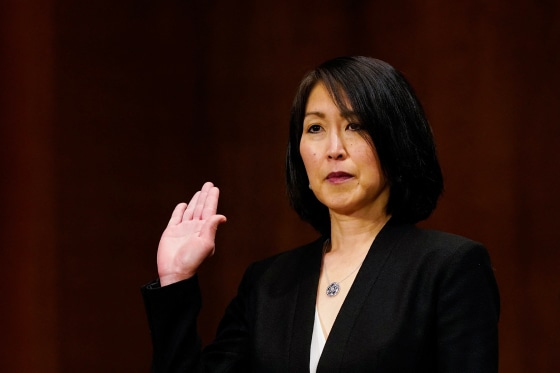Republican lawmakers grilled a Biden judicial pick on Tuesday, asking the Japanese American judge if affirmative action is akin to racial discrimination and bringing up a book review she wrote as a law student.
U.S. Magistrate Judge Kenly Kato, nominated for a seat on the U.S. District Court for the Central District of California, faced intense questioning about an article she wrote in 1995 when she was 23 and attending Harvard Law School. Part of the review, which Kato co-authored, says neoconservative Asian Americans “internalize the dialogue of oppressors, believing in the values of the status quo and condemning the activism of their group.”
Sen. Chuck Grassley, R-Iowa, asked Kato if she still believed that sentiment. The judge said she “had no idea what we were trying to convey.”
Kato declined NBC Asian America’s request for comment.
The topic of the article was revived by Sen. Ted Cruz, R-Texas, who prefaced his exchange with Kato by asking, “Is racial discrimination wrong?”
“Our Constitution prohibits discrimination on the basis of race,” Kato responded. “As a judge, I don’t deal with issues of morality”
Cruz said that Kato’s writing as a student conveyed that “to be sufficiently woke, an Asian American must support policies that discriminate against Asian Americans.” He referred to a lawsuit against Harvard — now to be heard by the Supreme Court — alleging that the university’s diversity initiatives discriminate against Asian undergraduates.
Asian American civil rights activists have cautioned against making this argument, saying that framing affirmative action as anti-Asian bias is “dangerous.”
“They weaponize concerns about anti-Asian attacks and violence against other minorities,” Janelle Wong, a professor at the University of Maryland, College Park, told NBC Asian America last month. “This is an old tactic in white supremacy’s playbook and should not be allowed to succeed.”
Apart from Kato's heated exchanges with GOP committee members, her nomination was celebrated by lawmakers and outside organizations. During her testimony, Kato spoke about her background, including the time her parents spent incarcerated in Japanese internment camps as children during World War II.
“Hearing those stories of my family’s first-hand experiences impressed upon me from a very young age the critical importance of securing our constitutional rights for everyone,” she said.
The National Asian Pacific American Bar Association applauded Kato's nomination when it was announced in December.
“Judge Kato’s life experience, as a daughter whose parents and family were incarcerated during World War II solely because they were of Japanese descent, has shaped her interest in constitutional protections and her work to ensure access to justice,” Sid Kanazawa, president of NAPABA, said in the statement. “With only 30 out of the 673 district court judges being AAPI, we urge the Senate to quickly confirm Judge Kato.”

